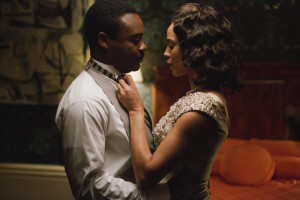In retrospect, American History always seems easy. Wasn’t it obvious that we had to break from England? Wasn’t it obvious that slavery had to go? The nation must have seen “separate but equal” as evil, yes? The black and white lens, so-to-speak, makes history very clear, does it not?
No, it wasn’t obvious. And as easy as it is to spot the evil in retrospect, it wasn’t quite as easy at the time as it is always shrouded. Take voting rights laws: In the south in the 1960s, there were three very stringent limitations on voting – membership sponsoring, poll tax and literacy tests. Now, none of these on their face said, “we don’t want African Americans to vote,” but that was exactly their intention and their effect — just as recently enacted voter fraud laws right now are designed to keep blacks from voting; on their face, they say no such thing; they say, “stop fraud!” This is a position people naturally back – “well, fraud is wrong.” It’s only when you dig deeper that you realize the kind of fraud described doesn’t actually exist (or exists in such small quantities to render it insignificant); the laws are there to make sure the electorate is as lily white as possible. The evil didn’t go away; it mutated.
Selma is sober reminder that what happened with Martin Luther King, Jr. in 1965 Alabama is just as relevant today as it was at the time. Much as I like to think of this time as a series of one-sided issues, it wasn’t. MLK (David Oyelowo) takes us through the struggle – dealing with the sympathetic-but-stubborn President Johnson (Tom Wilkinson), a supportive-but-fearful wife Coretta Scott King (Carmen Ejogo), an entire team of yes men and entire country of not yes men. I love the discovery of Selma as a hand-picked political battleground, mostly because Sheriff Jim Clark (Stan Houston) is a jackass. I love that the local minority youth group sees King as an invader, stepping on their toes. I love that Annie Lee Cooper (Oprah Winfrey) throws the first punch in a non-violent protest. Oh, she’s well within her moral right after the abuse she’s taken at the hands of the voter registrar, but still – non-violent. This isn’t helping.
There’s a very dark moment in Selma in which a non-King voting protest march happens at night. Without the cameras (if only you knew, 60s people, sometimes it doesn’t matter!), local cops are given free rein to bash heads, and bash they do. We like to imagine this can’t happen today, but recent events have told us it just isn’t so. No, we’re probably past horsed policemen chasing down non-violent protesters in broad daylight, Planet of the Apes style, but even with cameras, well, police abuse of African Americans? Yeah, that never happens. Go ahead, spin the tale that submission and conformity will forever be rewarded — that always rings true.
Now, did you ever notice how historic American figures are rarely played by Americans? My theory is we’re too close to the mythology to provide a human touch. That said, Selma really takes the cake in this department. David Oyelowo is English. Carmen Ejogo as King’s better half, is English. The (here pragmatic) LBJ is played by Tom Wilkinson, English. The loathsome Alabama Governor George Wallace is presented by Tim Roth, English. To be fair, J. Edgar Hoover (Dylan Baker) and Malcolm X (Nigel Thatch) were both played by Americans. Baker and Thatch were successful in delivering almost ten lines of dialogue combined! U.S.A.! U.S.A.!
Playing MLK, Jr. is a tough task. I will never hear a more powerful voice in my life. Never. Ava DuVernay doesn’t really force the issue. Most of the MLK oration is skillfully downplayed; we’re mostly concerned with the shrewd MLK, the one who eyes the prize, but has to walk the right path to get there. Oyelowo is up to this task. No, he’s not Daniel Day-Lewis’ Lincoln; he’s more Anthony Hopkins’ Nixon. He may not merit the personal prize in that assessment, but he doesn’t dishonor a legend, either.
A struggle for right
Waking America’s conscience
Burdensome, always
Rated PG-13, 128 Minutes
D: Ava DuVernay
W: Paul Webb
Genre: No justice, no peace!
Type of person most likely to enjoy this film: Civil rights advocates
Type of person least likely to enjoy this film: Bigots



